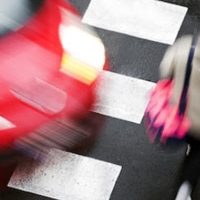Expensive Cars and Pedestrian Accidents: Could There be a Connection?

When a car hits a pedestrian, it is generally considered a random event. Certainly, things can happen, like drunk driving, distracted driving, poor weather, or other factors, that make hitting a pedestrian more or less likely in any given situation. But could you predict what kind of driver will be more likely to hit a pedestrian? What about someone who drives a more expensive car?
It may seem ridiculous, but that’s exactly what one study found. Bear in mind, as you will see, the study was not completely scientific, and many variables keep the study from any definitive conclusions.
Who Slowed Down for Pedestrians?
The study looked at people who were hired to walk in intersections, legally, in Las Vegas pedestrian crosswalks. All the test pedestrians walked in similar conditions—same type of day, same traffic pattern intersections, etc.
As the pedestrians were walking, the study observed the behavior of the oncoming traffic. They looked at whether a given vehicle slowed down, observed the pedestrian, yielded to the pedestrian, or otherwise gave other indications that the driver was observant of the pedestrian and respectful of his or her right of way.
Note that no test pedestrians were actually hit or injured during the study.
When noting which cars seemed to yield (or intend to yield) to the pedestrians, and which did not, the study then put a value on those vehicles, based on the current value of the car as best as they could tell.
Then they compared the data: With the value of the cars in mind, what was the value of cars that tended to observe, respect and yield to pedestrians, and which did not?
The More Car, the More Careless?
It turns out that when the math was done, as the value of a given vehicle went up by $1,000, the likelihood that the car would slow or stop for the pedestrian, decreased by 3%. So, the more expensive the car, the less observant they were of pedestrians, or at least, the less willing the cars were to slow down for the pedestrians.
Of all the vehicles looked at, only about a quarter of them slowed down at all, regardless of the vehicles’ value.
Gender played some role in who was more likely to slow down, but the largest determining factor was the value of the car being driven.
Why the Correlation?
Assuming that any conclusion can be drawn from this admittedly unscientific study, why are more expensive cars less likely to slow down?
Perhaps more expensive cars have more technology, and thus, drivers have just become reliant on technology to “see” pedestrians and slow or stop for them. Perhaps more expensive cars go faster, and faster cars have less time to see pedestrians and slow down.
There is no shortage of theories. But either way: Pedestrians get hit by all kinds of cars, and if you are one of them, it’s time to get help.
Were you injured by a pedestrian? Call the Knoxville personal injury lawyers at Fox Farley Willis & Burnette, PLLC today.
Sources:
people.com/human-interest/drivers-expensive-cars-less-likely-stop-pedestrians-study-says/
cnn.com/2020/02/26/world/expensive-car-drivers-study-scli-scn-intl/index.html
